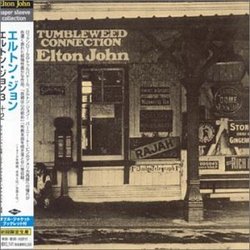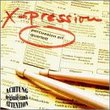A solid early Elton John album with nary a hit on it
Lawrance M. Bernabo | The Zenith City, Duluth, Minnesota | 04/29/2005
(5 out of 5 stars)
""Tumbleweed Connection" has the dubious distinction of being the only Elton John album from the Seventies that did not offer up a certified "hit" (neither did "Madman Across the Water" if you want to get picky, but "Levon" was always a highly requested song on FM radio). However, the lack of acknowledge hits just speaks in favor of this album, because anybody who listens to Elton John's albums knows full well that his best songs are rarely (if ever) the Top 40 hits. Even without the benefit of a hit single, this 1971 album still made it to #5 on the Billboard charts.Half the songs on "Tumbleweed Connection" are 4:59 or longer in life, which means the odds were long that they would ever be played on the radio. Yet theses songs, such as "Country Comfort" and "Burn Down the Mission," stand out as some of the best work by John and lyricist Bernie Taupin during this period. The latter track remains a prime choice for the big finish at an Elton John concert to this day. There is something of a "country/western" flair to the album, at least as interpreted by two Englishmen, represented by not only those two songs but "Ballad of a Well Known Gun," "My Father's Gun," and "Talking Old Soldiers." I think those who were listening to Elton John before he became a star (operationally defined as anything before "Honkey Chateau," always had a preference for these early albums, especially those where Paul Buckmaster was doing the arranging and conducting. Ironically, on many of these songs, such as "Come Down in Time," it is John's voice and not his piano playing that stands out (note: Dusty Springfield is one of the backing vocalists on the album). There is also "Love Song," which was written not by John & Taupin but Lesley Duncan, who plays acoustic guitar and sings the duet.Elton John was certainly prolific during this early period and had the great advantage of those Buckmaster string arrangements. The self-titled "Elton John" album was released in the summer of 1970, with "Tumbleweed Conection" following in February 1971. That same year saw the live "11-17-70" and the "Friends" soundtrack released as well, with "Madman Across the Water" coming out at the end of the year. In 1972 with "Honkey Chateau," Elton John would become a star. But all of this is before the dazzling costumes and bizarre collection of eyeglasses, which made Elton John the Liberace of pop rock. This is way back almost to the beginning, when it was all about the music. By the time "Goodbye Yellow Brick Road" came out, those days were clearly over. This CD version of the album offers up a couple of bonus tracks from John and Taupin, with "Into the Old Man's Shoes" and the original version of "Madman Across the Water," which clocks in at 8:52."


 Track Listings (12) - Disc #1
Track Listings (12) - Disc #1
